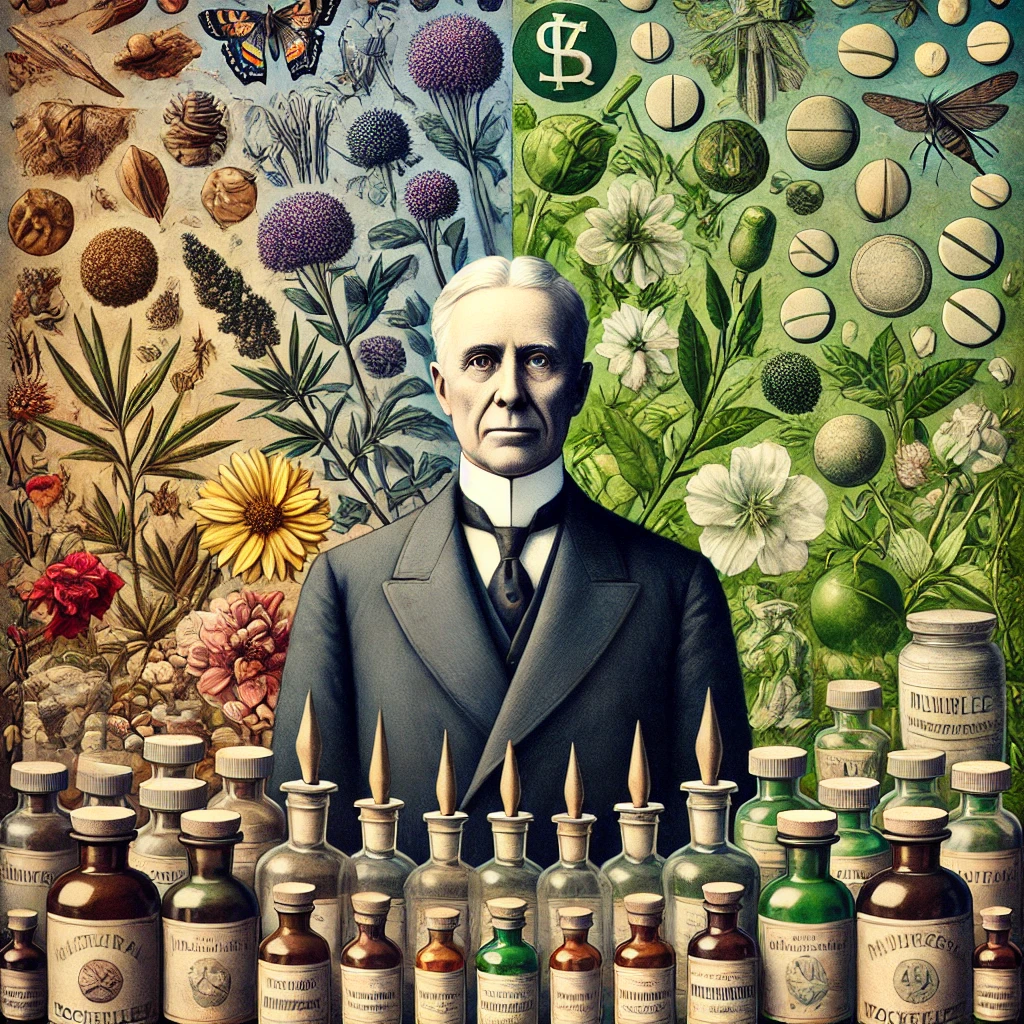While the business of modern Western medicine boasts numerous advancements and benefits, understanding its evolution requires an examination of influential figures who shaped its trajectory. John D. Rockefeller, widely known for his dominance in the oil industry, played a crucial role in transforming the medical landscape. His influence went beyond petroleum, extending into the realms of pharmaceuticals and healthcare. This transformation didn’t just alter the practice of medicine; it fundamentally shifted the societal perception of health, healing, and the role of natural remedies.
The Birth of the Medical Monopoly
By the early 20th century, Rockefeller had achieved unprecedented control over the petroleum industry through Standard Oil, monopolizing about 90% of the U.S. market. Around this time, the burgeoning field of petrochemicals—products derived from oil, including plastics and synthetic pharmaceuticals—was beginning to take shape.
Rockefeller, a visionary in both business and market expansion, recognized an opportunity to extend his monopoly beyond oil to the emerging chemical and medical industries.
The allure of petrochemicals lay in their potential to create synthetic medicines, known as Allopathic medicine, that could be patented. Patents meant exclusivity and long-term profits, something that natural remedies and traditional healing methods could not offer since they were based on plants and substances that could not be owned.
However, Rockefeller faced a significant obstacle: the prevalent use of natural medicine. During this era, holistic and herbal remedies were mainstream in the United States. Naturopathy, homeopathy, and other traditional healing practices were widely accepted, with nearly half of all doctors practicing these methods.
To monopolize the medical industry, Rockefeller needed to marginalize this widespread reliance on natural remedies and promote a system that relied heavily on patented, synthetic drugs.
The Flexner Report: A Catalyst for Change
Rockefeller’s strategy to reshape medicine began with a report commissioned in 1910 and authored by Abraham Flexner. The Flexner Report evaluated the state of American medical education and was scathing in its criticism of the existing system. It claimed that many medical schools were subpar and unscientific, branding natural healing methods as quackery.
Flexner’s recommendations were aligned perfectly with Rockefeller’s goals. He advocated for the standardization of medical education, favoring allopathic medicine—a system that treated symptoms with drugs or surgery—over traditional healing practices. This approach focused on treating diseases with specific drugs, many of which could be synthesized from petrochemicals, fitting neatly into Rockefeller’s business model.
As a result of the Flexner Report, Congress passed laws that restructured medical education in the United States. Medical schools were required to conform to strict standards that emphasized allopathic medicine. Schools teaching holistic or herbal therapies either had to adapt to the new model or face closure. This regulatory overhaul drastically reduced the number of practitioners of natural medicine and bolstered the dominance of drug-based treatments.
Funding and Control: The Rockefeller-Carniege Alliance
The Flexner Report was only the beginning. Rockefeller, along with his associate Andrew Carnegie, implemented a strategy to ensure long-term control over medical education. They provided significant funding to medical schools, but with stringent conditions: the schools had to adopt the allopathic curriculum and eliminate courses on herbal medicine, nutrition, and other natural therapies.
These grants were generous but came at a cost. Schools that accepted Rockefeller and Carnegie’s funds became beholden to their agenda. Consequently, by the 1920s, the curricula of most medical schools in the U.S. had been standardized to exclude teachings on holistic healing methods. This financial stronghold effectively suppressed alternative medical practices and cemented the foundation of a drug-based medical system.
The Smear Campaign Against Natural Remedies
Beyond restructuring medical education, John D. Rockefeller launched an aggressive campaign to discredit alternative medicine. Using his extensive network of media outlets, he orchestrated smear campaigns that labeled natural therapies as unscientific and dangerous. Homeopathy, herbal medicine, and other traditional treatments were systematically ridiculed and dismissed as pseudoscience.
Doctors who practiced these methods faced severe repercussions. Many were discredited, ostracized, or even jailed for using treatments that had been safe and effective for generations. Public opinion, influenced by the media and the newly established medical authorities, began to turn against these traditional practices. The new medical paradigm promoted the idea of a “pill for every ill,” encouraging the use of pharmaceuticals as the primary solution for health issues.
The Rise of “Big Pharma”
Rockefeller’s influence laid the groundwork for what would eventually become the modern pharmaceutical industry, often referred to as “Big Pharma.” This industry grew exponentially, profiting from the widespread adoption of synthetic drugs.
The idea that every health issue could be treated with a specific drug became ingrained in the medical community and the public consciousness.
Pharmaceutical companies, armed with patents and backed by powerful financial interests, became the new gatekeepers of medicine. Treatments that were once the domain of traditional healers were now exclusively the purview of medical professionals trained in allopathic methods. The marginalization of natural medicine was nearly complete, and the pharmaceutical industry was poised to become one of the most profitable sectors in the world.
Global Ambitions: Extending Influence Beyond the U.S.
Rockefeller’s ambitions were not limited to the United States. He sought to export the Western medical model to other parts of the world, including China, which had a rich tradition of natural and holistic medicine.
In 1914, Rockefeller established the China Medical Board, investing millions of dollars to modernize Chinese medical education. His goal was to replace Traditional Chinese Medicine (TCM) with allopathic practices, similar to what had been achieved in the U.S.
Although the impact of Rockefeller’s efforts in China was limited, his attempt underscored the global scope of his vision. He aimed to create a worldwide system of medicine that prioritized pharmaceutical treatments over natural remedies, reinforcing the dominance of a medical model centered around profit.
The Legacy of Rockefeller’s Medical Monopoly
The long-term effects of Rockefeller’s influence on medicine are evident today. The pharmaceutical industry wields immense power, influencing not only medical practices but also policies and regulations.
Natural treatments, which were once mainstream, are often dismissed or even criminalized. For example, it is illegal in many jurisdictions for doctors to treat cancer with anything other than chemotherapy, radiation, or surgery—methods that generate billions in revenue for pharmaceutical companies.
Rockefeller’s legacy is also visible in organizations like the American Cancer Society, which he helped establish in 1913. These institutions have shaped the discourse around health and treatment options, often promoting pharmaceutical solutions while downplaying or disregarding natural alternatives.
The Cost of Corporate Medicine
Understanding this history provides insight into why the current medical system operates as it does. Patients are often treated more like customers, and healthcare costs have skyrocketed. Despite leading the world in healthcare spending, the United States ranks poorly in terms of health outcomes compared to other developed nations. This is a direct consequence of a medical system built on the pursuit of profit rather than patient well-being.
The Demonization of Natural Remedies
Rockefeller’s drive to control the pharmaceutical industry meant that any natural, non-patentable treatment had to be discredited to ensure the dominance of synthetic drugs. This strategy extended beyond the suppression of traditional medical schools and practices; it included the vilification of natural substances that had been used for centuries.
For example, kratom, a tree native to Southeast Asia, has been used for centuries as a natural remedy. However, in recent years, it has faced intense scrutiny and regulatory challenges in the U.S., despite a lack of evidence supporting claims of its danger. Similarly, cannabis, once widely used for medicinal purposes, was criminalized in the 20th century, largely due to campaigns funded by powerful industrial interests, including Rockefeller’s.
The demonization of these natural remedies can be traced back to the same tactics used by John D. Rockefeller to marginalize alternative medicine in the early 1900s.
By labeling these substances as dangerous and unscientific, the pharmaceutical industry has managed to maintain its monopoly on treatment options, limiting the public’s access to potentially safer and more holistic alternatives.
A Reawakening: The Return to Natural Therapies
Today, there is a growing movement that challenges the dominance of the pharmaceutical industry and seeks to revive interest in natural remedies. As people become more aware of the limitations and side effects of pharmaceutical drugs, many are turning back to traditional practices and natural substances like kratom and cannabis for their health needs.
This shift represents a reawakening to the value of natural therapies, which have been marginalized for over a century. It also signals a broader questioning of a medical system that prioritizes profit over well-being. While the legacy of Rockefeller’s influence still looms large, the increasing interest in holistic health suggests that the tide may be turning.
Conclusion: Unraveling the Threads of History
The story of how John D. Rockefeller shaped Western medicine is a tale of power, influence, and the far-reaching impact of corporate interests on public health.
By creating a medical monopoly based on synthetic pharmaceuticals, Rockefeller not only reshaped the practice of medicine but also redefined societal attitudes toward health and healing. His legacy is a medical system that often prioritizes profit over patient care, marginalizes natural remedies, and treats symptoms rather than addressing root causes.
As we continue to navigate the complexities of modern healthcare, understanding this history is crucial. It reminds us to remain vigilant about the influences that shape our medical choices and to advocate for a more holistic approach to health that respects both scientific advancements and the wisdom of traditional healing practices.






0 Comments